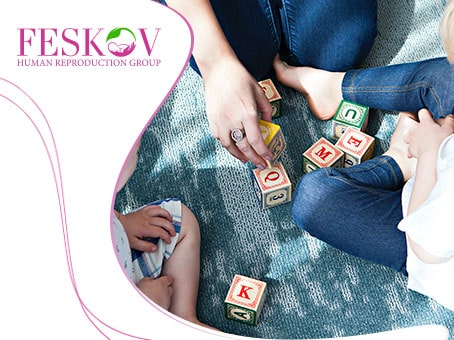Is intelligence transmitted genetically? Features of genetic inheritance When passing egg donation programs in Feskov Human Reproduction Group, future parents can find a healthy candidate of any phenotype from an extensive database. However, are mental traits actually inherited?
Is intelligence transmitted genetically?
In fact, the top priority when searching a donor is to find a healthy, adequate and happy woman who is ready to donate her genetic material for the benefit of other people. But, of course, it is natural for parents to want to see their continuation in their offspring. Intelligence is a complex part of human consciousness, which, in addition to genetic factors, is influenced by other factors. Intelligent egg donors are sought after by many intended parents who value not only genetic compatibility but also cognitive traits that they hope to pass on to their future children.
If you do not go into details, then, when an egg of a sufficiently intelligent woman is fertilized with the sperm of a sufficiently intelligent man, a sufficiently intelligent child will be born. Under the condition of upbringing in a family with the priorities of education, good academic performance and the pursuit of knowledge, it is likely that he will be intellectually developed.
However, not all is so simple. For many years now, scientists have been trying to break the genetic code of the intellect. This is a lofty goal, since even defining the concept of intelligence is not an easy task. The most complex human traits, such as intelligence, are multifactorial, that is, they consist of different concepts. These differences between people are influenced by both genetic and biological factors.
To determine how genes affect multifactorial traits, scientists often turn to research. involving twins and adopted children. Identical twins have 100% genes and the same habitat, while fraternal twins have only 50% of genes. If the trait is highly genetic, like a high IQ, then identical twins should have it more often than fraternal twins. Studies of adopted children determine whether adopted children have traits similar to adoptive (environment) or biological (heredity) parents.
Survey data indicate that 50% of differences in intelligence are associated with inherited genetic factors, while the remaining 50% are associated with differences in the environment:
parenting;
education;
home conditions;
relationships at school;
access to resources;
food, etc.
There are likely hundreds, if not thousands, of unidentified genes that affect intelligence or not.
Usually intelligence correlates with high academic achievement. However, many other multifactorial traits are likely to play a role as well:
self-motivation;
emotional intellect;
temperament;
curiosity;
personality traits, etc.
Some studies have shown that high academic achievement can be even more hereditary than generalized intelligence alone. At the same time, it is known that such regalia is also influenced by many socio-economic factors:
income;
financial stability;
access to education;
capabilities;
social class;
status and privileges.
But then what exactly is inherited by the baby, what are the traits and features from biological parents?
Features of genetic inheritance
Even a relatively “simple” trait such as hair, skin, or eye color is influenced by several different genes. Knowing the hair color of the egg donor can give an idea of what might be the baby's hair, but the resulting hair color will also depend on which specific versions of several genes the baby inherits. For example, the gene for blonde hair can be suppressed by the gene for dark hair. Since, usually, dark hair, eyes or skin belong to the dominant genes. But, there are always exceptions.
Other qualities, such as height or intelligence, are even less obvious. They not only involve many genes, but other factors that were discussed above are also strongly influenced. For example, growth involves a complex interaction of several hundred genes that control biological processes (bone growth, hormones, etc.). But it is also dependent on the quality of food. Simply put, the average height of children from the same biological parents will be between the height of a dad and a mom. However, if the sperm of a short man fertilizes the egg of a tall woman, the chances of having a tall baby are unlikely to increase. Genetics is not as simple as it seems at first glance.
Concerning donors, some of the existing traits will be inherited genetically (hair, eye color, skin), some will be partially transferred (height, mental ability), plus, they will be influenced by non-genetic factors. Other traits (moral principles, morality, spirituality) are generally not inherited and completely depend on the circumstances and environment in which a person grew up and lives. For egg donors, one of the potential disadvantages of egg donation is the time commitment involved, from the screening process to the actual donation.
Please do not hesitate to contact us (by telephone, email, Viber, Skype or WhatsApp) if you need further information.
Our Customer Service Representatives are eager to help you with whatever you need.
Intelligence is a subjective quality. Which comes in different forms - a person with a doctorate degree, or someone who dropped out of school and opened his own successful business, or someone who created a unique innovation without education. Donor intelligence is determined not only by test results and educational institutions that have been attended. Feskov Human Reproduction Group prioritizes donor intelligence to provide transparency and peace of mind to individuals or couples seeking donor-assisted reproduction services.
We are all different. And this is great! Therefore specialists of Feskov Human Reproduction Group, with the help of reproductive services , fulfill people's dream of their own unique offspring!
Tags:
donor of oocytes egg donor egg donation


